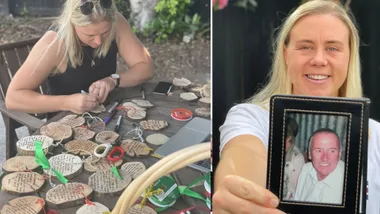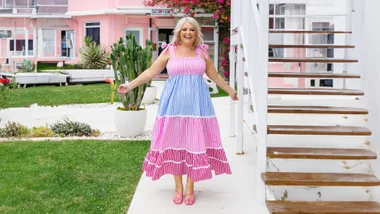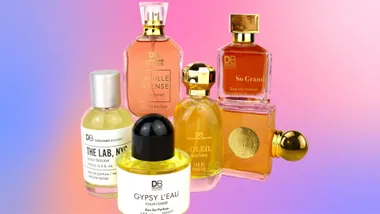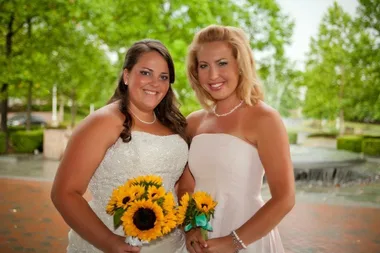Natasha Russell, 35, from Bundaberg, Qld, shares her story
I sat patiently in the meeting room, waiting for my boss to begin.
“Thanks for coming, everyone,” she began, “now that summer’s approaching, it’s important for everyone to make sure they’re maintaining personal hygiene…”
Her eyes landed on me, her eyebrows raised, before slowly scanning the room.
“We’ll be providing deodorant in each bathroom for you to use at any time,” she said.
My eyes prickled with tears. Although she was addressing the entire team, I knew she was talking about me.
Afterwards, I left as quickly as I could, trying desperately not to cry.
Ever since I was 10 years old, I’d had trouble with my body odour.
No matter how much deodorant I wore, a cloud of bad BO followed me.
Kids used to tease me about it at school, calling me stinky and making bad jokes.
“Didn’t she shower this week?” they’d snigger cruelly.
Although it was extreme, I just accepted that I was hormonally a smelly person.
When I was 18, it seemed to go away and for five years, I lived a normal life without being terrified of what others thought of me.

I’ve had the problem since I was little.
(Image: Supplied)
Then the odour came back with a vengeance. It wasn’t just a bad BO smell anymore, it was much worse.
It smelt like cat poo, burnt rubber and garbage. By then, I was a young mum, and whenever I’d go out, people looked me up and down.
They saw my tattoos and coloured hair, and thought I was an unkempt hooligan.
My self-esteem plummeted more than it already had. But the body odour wasn’t my only issue.
Whenever I ate foods other than peeled fruits and vegetables, my body ached.
My doctor just told me to use heavy strength deodorant and diagnosed me with Irritable Bowel Syndrome.
Deep down, I knew that wasn’t it. No matter what I did, even the strongest deodorants couldn’t help.
Despite that, I got on with my life. I fell in love with a man named Tom. Although I was certain I smelt bad, he swore he couldn’t detect it.
As our kids grew up, they got used to my odour, except my two-year-old.
“Disgusting Mummy!” she’d complain, scrunching up her nose.
Still, I was grateful most of my family could stand to be around me, but I’d often get nasty looks and comments in public.
One day, I was watching the show Embarrassing Bodies when a woman came on with similar symptoms to me.
She had pain when she ate any foods that weren’t natural, she smelt awful and had chronic bad breath.
Although my condition wasn’t as bad as hers, I made a mental note.
A year later, my breath started to reek.
I went to the dentist, praying it was just a bad tooth or gum disease.
“Everything’s fine,” he said, “but I’ve never smelt anything like this before.”

Tom and my family have been so supportive.
(Image: *Supplied*)That night, I thought back to the Embarrassing Bodies episode and desperately searched symptoms online.
I read about a disorder called trimethylaminuria that occurs when the body can’t break down the compound produced in the intestines when certain foods are eaten.
As the trimethylamine accumulates, it’s released in bodily fluids and breath. Often it can smell like rotten fish, faeces and garbage – exactly what I was experiencing.
I went back to the doctor demanding the specific urine test for a diagnosis. It came back confirming that I’d had trimethylaminuria 1 since birth.
After that, I reached out to online support groups and realised that almost all foods – meat, red vegetables, or anything that’s been scientifically altered like broccolini, seafood, or dairy – contained trimethylamine.
The only way to make myself odourless was to eat an incredibly clean diet of peeled raw pears, avocado, sweet potato and peaches.
Although it helped, I felt like I was missing out on a huge part of life.
I loved cooking beautiful meals for my family each night, so it was hard to watch them dig in while I sliced into my bland fruit and veg.
Once in a while, I indulged in a burger or a serving of seafood with a cheeky beer. But within hours, I’d smell so bad that I couldn’t go out in public without getting horrible stares for days.
One time, after eating a burger, I went shopping with the kids when a man came up to me. “You’re disgusting,” he said aggressively. “Go take a shower!”
It was devastating. If only he knew I’d do anything to wash it all away.
Other times, when I was having a beer with Tom and a few mates at the pub, I quickly became the butt of the joke.

Now, I’m trying to help others feel less alone.
(Image: *Supplied*)“How can such a pretty thing smell so bad?” I overheard one of the blokes say.
Soon the whole room was tossing childish poo jokes back and forth.
Tom and I had spent hours explaining the science of my condition to these people, who we thought were friends, but they still made me feel like an outcast.
Eventually, as my condition worsened, I quit my office job and became isolated. I struggled with depression and anxiety.
Some days, I shower multiple times and brush my teeth until my gums bleed just trying to make the odour go away but nothing works.
Thankfully, my family are my biggest support. No matter what I smell like, they’re always there for hugs and kisses.
Even my toddler will hold her nose and crawl into my arms for a cuddle.
After my diagnosis, I became very active with support groups for my condition online.
Although I lead a difficult life, so many people had it much worse. And it had made such a difference in my life knowing I’m not alone, so now, I try to help as many people as I can.
Especially kids who are copping it from bullies like I did.
I’m sharing my story to raise awareness about trimethylaminuria.
People might think I’m dirty or disgusting, but people like me are suffering from a real condition that affects our lives.
It may be incurable but with the right diet and support, we can live the happy lives we deserve.
Natasha is donating her payment to the Australian Liver Foundation.









